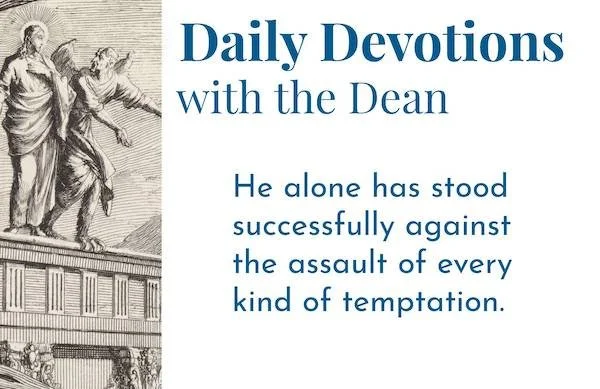Friday • 2/23/2024 •
Friday of 1 Lent, Year Two
This morning’s Scriptures are: Psalm 40; Psalm 54; Genesis 40:1–23; 1 Corinthians 3:16–23; Mark 2:13–22
This morning’s Canticles are: following the OT reading, Canticle 10 (“The Second Song of Isaiah,” Isaiah 55:6–11; BCP, p. 86); following the Epistle reading, Canticle 18 (“A Song to the Lamb,” Revelation 4:11; 5:9–10, 13, BCP, p. 93)
Welcome to Daily Office Devotions, where every Monday through Friday we bring to our lives that day’s Scripture readings, as given in the Book of Common Prayer. I’m Reggie Kidd, and I’m grateful to be with you this Friday of the first week of Lent, as we prepare for Holy Week.
Psalm 40 and David’s deliverance from the pit. David feels compelled to extol Yahweh’s righteousness, his faithfulness, his salvation, and his steadfast love (Psalm 40:10). For after “waiting and waiting” (Psalm 40:1 my rendering) and crying out for help from the bottom of a desolate pit, David finds deliverance from Yahweh: “[H]e stooped to me and heard my cry for help. He pulled me up from the seething chasm, from the mud of the mire. He set my feet on rock, and made my footsteps firm…. He put a fresh song in my mouth…” (Psalm 40:1b–3a NJB).
Genesis 37 and Joseph’s deliverance from the pit. Psalm 40 could have been Joseph’s song. Today’s chapter in Genesis places Joseph in the bottom of his own desolate pit, “the seething chasm” and “the mud of the mire.” He’s been here before, when his brothers threw him into a pit, and conspired first to murder and then to sell him off to Midianite slavers. Now, falsely accused of sexual assault by Mrs. Potiphar, he’s in Potiphar’s prison. His God-given power to interpret dreams secures deliverance for his fellow prisoner, Pharaoh’s cupbearer. In return for that service, he asks simply for the kindness (ḥeseḏ) of being remembered (Genesis 40:14). The thanks he receives, instead, is to be forgotten (Genesis 40:23) — forgotten, that is, until in Yahweh’s perfect timing, the cupbearer finally remembers two years later! Joseph will be lifted up from prison and raised to a position from which he will serve as deliverer of all of Egypt and surrounding nations.
Meanwhile, from his desolate pit, Joseph learns the spiritual discipline of “waiting and waiting” and, no doubt, of calling out, as Bono sings in U2’s hauntingly beautiful version of Psalm 40, “How long?” May David’s song minister to each of us whenever we find ourselves in “the seething chasm” and “the mud of the mire.”
“I proclaimed righteousness in the great congregation” — Psalm 40:10a. David tells “the great congregation” what God has done for him, because he knows his personal experience of deliverance does not belong to him alone. His life belongs not just to Yahweh but to the people he is called to serve. He’s redeemed by God, not just for his own sake,, but by God for all God’s children. His personal story belongs to the whole congregation, so he must proclaim it to them.
Image: "Zombie Run Pittsburgh (311)" by Rhett Landry is marked with CC BY-SA 2.0
Today’s reading in 1 Corinthians sounds a similar note: “If anyone destroys God’s temple, God will destroy that person. For God’s temple is holy, and you are that temple” (1 Corinthians 3:17). The “you” here is plural, by which Paul means that the Corinthians together make up God’s temple. There is a whole of which each Corinthian believer is a part, and it is a whole that is greater than the sum of its parts. The Corinthians are acting like each one of them is a separate, independent agent — free to choose their favorite preacher, free to sue each other to secure their rights, free to have sex (or not have sex) with whomever they please, free to display their gifts of spiritual prowess to make themselves look good.
Paul says they together are God’s “field,” God’s “building,” and God’s “temple” (1 Corinthians 3:9,16). No matter how many members they are, the important thing is that they are “one body” (1 Corinthians 10:17; 12:12–13). And therefore, even sometimes at the cost of curtailing genuine liberties, they are to do only what “is beneficial” to everybody, only what “builds up” the whole (1 Corinthians 10:23). They are to exercise their individual gifts “for the benefit of all” (1 Corinthians 12:7). They are to “wait for one another” (1 Corinthians 11:33), and do nothing that “divides Christ” (1 Corinthians 1:13), nothing that goes beyond what Paul teaches “in all the churches” (1 Corinthians 4:17; 7:17; 14:33b). They — and we as well — are, in a word, to let love rule (1 Corinthians 13).
A word of application for Lent: Lent isn’t necessarily only about subtraction; it can be about addition as well. How about we add love? “Let all that you do be done in love” (1 Corinthians 16:14).
As do many of David’s psalms, Psalm 40 looks forward to a distant future, to a deliverance that shatters expectations, and — indeed, to a Deliverer who surpasses all predecessors. The writer to the Hebrews sees in Psalm 40 an advance portrait of Christ:
“Sacrifices and offerings you have not desired,
but a body you have prepared for me;
6 in burnt offerings and sin offerings
you have taken no pleasure.
7 Then I said, ‘See, God, I have come to do your will, O God’
(in the scroll of the book it is written of me)” (Hebrews 10:5–6; citing Psalm 40:8–9).
Today’s reading in Mark highlights features of Jesus’s ministry that make him this Deliverer of an expectation-shattering deliverance: 1) he calls ordinary people to an extraordinary life (Mark 2:13–14); 2) he portrays himself as friend of sinners and physician of the soul-sick (Mark 2:15–17); 3) he declares himself to be the long-awaited Bridegroom who has come for God’s Bride; and 4) therefore it’s time to let ourselves become new wineskins for the new wine of God’s great wedding feast (Mark 2:21–22).
May God the Father enable us to live today in the knowledge that no matter how deep the pit we find ourselves in, he hears our cry. May God the Holy Spirit create in us hearts that love and serve one another, “the temple of God.” May Christ, God’s dear Son, prove himself to be our Friend, Physician, and Groom.
Be blessed this day,
Reggie Kidd+













